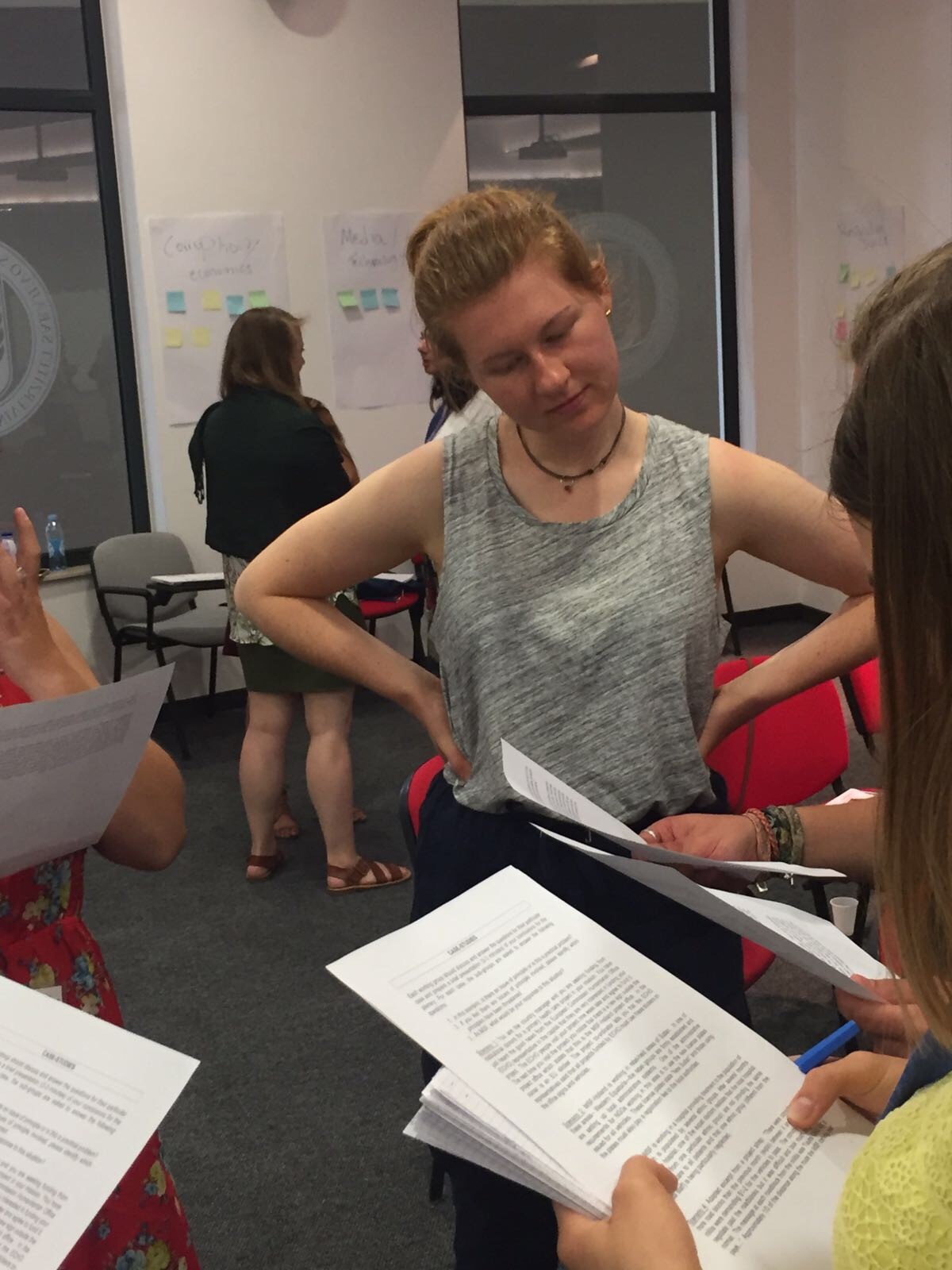By Phillipa Meikle
On the last day of the first week of our Symposium, we enjoyed a presentation regarding Memory and Reconciliation from Dr. Sabina Čehajić-Clancy, who is an Associate Professor of Political Psychology, Department of Political Science and International Relations at our host school, SSST. She provided an outline of a variety of her research projects, based in conflict and post-conflict situations throughout the world, including Bosnia and Herzegovina, Chile, Poland and Israel.
One of these studies concerned the impact of a strong individual or group mindset upon perceptions of the conflict in Bosnia and Herzegovina. This study focused on a group of individuals who self-identified as Bosnian Serbs, all of whom came from a primarily Bosnian Serb town. One group focusing on group identity had an hour-long discussion surrounding their ethnic identity of being Serbs, and aspects of Serbian culture that made them proud to be Serbs, such as the success of Novak Djokavic.

Surveys following the discussion found that such discussions decreased the group’s sense of guilt surrounding the events of the Bosnian War, and lowered endorsement for acts of reparation for those who suffered during the War.
Another group had an hour-long discussion focusing on self-affirmation, describing individual achievements for which members of the group felt pride, such as success in dancing competitions. The study found that such discussions led to a decrease in feelings of guilt and increased acceptance of enabling reparation to occur. While this particular study did not include a follow-up study over the long-term, similar projects in Chile and Poland have found positive long-term effects from these self-affirming discussions which could indicate an incredibly effective tool for progressive reconciliation.
In this manner, Dr. Sabina Čehajić-Clancy demonstrated to us that nationalistic ideals have a negative impact upon the reconciliation process, while focusing on the individual and personal achievements can lead to a greater level of sympathy and understanding for other ethnic groups. Her suggestion for facilitating the process of reconciliation amongst the ethnic groups in Bosnia was to introduce education reforms in schools in order to involve a greater focus upon individual achievements.
Dr. Sabina Čehajić-Clancy also relayed her findings on another project which revolved around intergroup contact. The study required people from the various Bosnian ethnic groups to have sustained contact with each other, such as a week-long trip to a remote location. We were informed that these studies often resulted in increased negative perceptions of the other groups, rather than increased tolerance and sympathy. Dr. Čehajić-Clancy shared her thoughts on these results, explaining that such interventionist and forced measures were ineffective due to the overriding history of conflict between these ethnic groups and the way that this inevitably results in individuals portraying these ethnic narratives and creating a block between people from different ethnic groups.
Dr. Čehajić-Clancy mentioned that she found that any increased negative perceptions was not a direct result of the contact with other ethnic groups. Additionally, she found that people with already existing positive experiences with ‘others’, such as having old friends or good relationships with neighbours from other ethnic groups, often led to such individuals being more accepting of strangers from those ethnic groups. Furthermore, individuals from minority groups throughout the Balkans, regardless of which ethnic group they came from, were more likely to be open towards other groups and more accepting of the reconciliation process than individuals who lived in a country in which their ethnic group was in the majority.
Finally, Dr. Čehajić-Clancy outlined another study which revolved around moral exemplars. In this study, individuals were exposed to a documentary which portrayed people generally classified as being morally responsible for atrocities, such as the Germans, in a positive light, focusing on their engagement in acts of a high moral standard. Those individuals who watched the documentary represented more positive views on this nationality when surveyed following the presentation.
In this manner, Dr. Čehajić-Clancy outlined a variety of different methods which could be used in order to increase the positive perceptions of other ethnic minorities in Bosnia and Herzegovina. An interesting discussion ensued surrounding the fact that while the three main ethnic groups were clearly established prior to the Dayton Agreement, the Constitution has deeply embedded the continued distinction and separation of these ethnic groups into modern Bosnia and Herzegovina. While Dr. Čehajić-Clancy indicated that it was important not to unilaterally attempt to break peoples’ ethnic identity, she believes that it would be a very positive step for reconciliation if the groups organically identified more with an overall Bosnian identity. A recognition of the incredibly complex and multi-faceted nature of personal identity, moving beyond the salient distinction between Bosnian Croats, Serbs and Bosniaks is likely to have a very positive impact upon the relationship between all Bosnian people, and facilitate the post-conflict transition.

